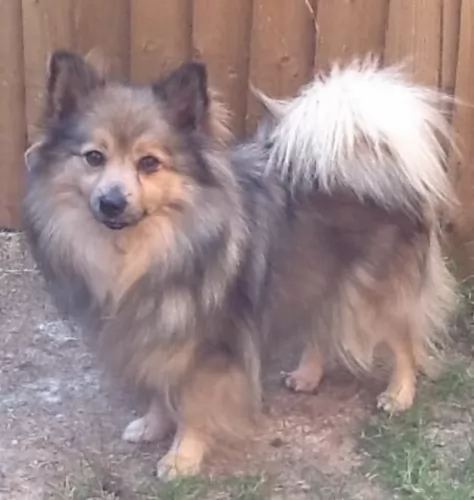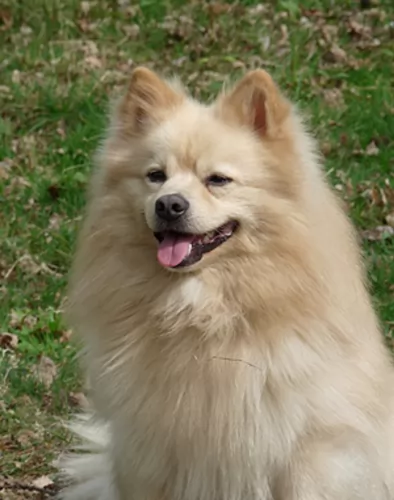 Petzlover
Petzlover German Spitz (Mittel) is originated from Germany but Wheaten Terrier is originated from Ireland. German Spitz (Mittel) may grow 12 cm / 4 inches shorter than Wheaten Terrier. German Spitz (Mittel) may weigh 9 kg / 19 pounds lesser than Wheaten Terrier. German Spitz (Mittel) may live 3 years more than Wheaten Terrier. German Spitz (Mittel) may have less litter size than Wheaten Terrier. Both German Spitz (Mittel) and Wheaten Terrier requires Moderate Maintenance.
German Spitz (Mittel) is originated from Germany but Wheaten Terrier is originated from Ireland. German Spitz (Mittel) may grow 12 cm / 4 inches shorter than Wheaten Terrier. German Spitz (Mittel) may weigh 9 kg / 19 pounds lesser than Wheaten Terrier. German Spitz (Mittel) may live 3 years more than Wheaten Terrier. German Spitz (Mittel) may have less litter size than Wheaten Terrier. Both German Spitz (Mittel) and Wheaten Terrier requires Moderate Maintenance.
 Originating in Germany, the German Spitz Mittel is an alert, vigilant dog and it is these qualities that made him sought after for working on farms.
Originating in Germany, the German Spitz Mittel is an alert, vigilant dog and it is these qualities that made him sought after for working on farms.
He is no new breed and is the 3rd largest of the five German Spitz varieties. It is believed that the German Spitz descended from the Northern sled and herding dogs which arrived with the Vikings into Europe. When you do research you see that the dogs are mentioned in German literature which dates way back to to 1450 already.
 The dog was bred to be a useful dog to have around the farm. He was needed to help with the guarding and herding of livestock and to keep the rat population down.
The dog was bred to be a useful dog to have around the farm. He was needed to help with the guarding and herding of livestock and to keep the rat population down.
This little dog has a long history, but in spite of this, he wasn’t recognized as a breed in his home country by the Irish Kennel Club until 1937.
It was in 1943 that the Wheaten was recognized by the British Kennel Club. They were exported to the United States in the 1940s and recognized by the American Kennel Club in 1973.
 The German Spitz Mittel is similar in looks to the other sizes of German Spitz. The Mittel is a medium sized dog and stands between 30 and 38cm in height and weighs between 7 and 11kg. You’ll find him in solid colors such as tan, liver, white, fawn, black or a mix of these colors.
The German Spitz Mittel is similar in looks to the other sizes of German Spitz. The Mittel is a medium sized dog and stands between 30 and 38cm in height and weighs between 7 and 11kg. You’ll find him in solid colors such as tan, liver, white, fawn, black or a mix of these colors.
He has a soft woolly undercoat and a long outercoat with a mane-like ruff at the neck. He has a fairly long muzzle, dark eyes, sharp erect ears and a bushy tail which curls over his back.
Affectionate, faithful, and always happy by nature, the German Spitz Mittel is a family companion that wants to be part of everything his human family is up to. He makes a good watchdog. He is alert and has a distrust of strangers.
He gets on well with children in the home and he can also live in peace with other dogs. Because he is an intelligent dog, you won’t have much trouble with training- and socializing him, although he will require a firm, consistent owner and trainer.
Training and socialization are important as there are always some important commands such as sit, stay, come and lie down that you will want him to respond to immediately.
 The Wheaten Terrier is a robustly built, medium-sized dog with males and females standing at between 43 to 50cm in height and weighing between 13 to 20kg.
The Wheaten Terrier is a robustly built, medium-sized dog with males and females standing at between 43 to 50cm in height and weighing between 13 to 20kg.
The soft, single coat is a silky texture and a wheaten, gingery color. A bonus is that the coat doesn’t shed much. Puppies are born with darkish coats of a reddish-brown color but the coat lightens significantly as the puppy grows older.
Most Wheaten Terrier owners opt to have the dog professionally groomed. Their tails have always been docked.
Your Wheaten Terrier is a smart dog, albeit headstrong and stubborn. His intelligence makes it easy to have him trained.
They love their human family and aren’t known for any aggression issues. They’re energetic, playful dogs and are sometimes even looked upon as being hyperactive. They’re able to get along well with other dogs and cats in the house. They generally make great family pets.
These dogs are well suited to life in the city as well as the countryside just so long as he gets his daily walks and other forms of exercise.
 People who have owned a German Spitz Mittel are delighted with him, saying that he is such an easy-going, happy dog. He is social and thrives on the interaction he has with his human family.
People who have owned a German Spitz Mittel are delighted with him, saying that he is such an easy-going, happy dog. He is social and thrives on the interaction he has with his human family.
He won’t do well if you simply put him in your backyard and forget about him, using him merely as a watchdog.
The German Spitz Mittel dog is one dog that definitely lives up to the title of man’s best friend. He is social, happy, loving, loyal, playful, entertaining and smart too, and when you treat him the way he deserves, you’ve got the most awesome friend.
 The Wheaten Terrier is such a bouncy, lively little dog that he brings joy into any home.
The Wheaten Terrier is such a bouncy, lively little dog that he brings joy into any home.
He is energetic, playful and full of the joys of living but you don’t want to take advantage of his good nature.
Don’t leave him stuck in your back yard but include him in all your family activities. He’s your best friend, providing you with unconditional love that few humans can equal.
 German Spitz dogs are healthy, and when you shower him with love and attention and good food, you can expect to have him around for up to 15 years of age.
German Spitz dogs are healthy, and when you shower him with love and attention and good food, you can expect to have him around for up to 15 years of age.
Of course, as with any other healthy dog breeds, there are always one or two common dog illnesses that your dog may get. These include hip dysplasia and eye diseases. If you notice symptoms that indicate possible joint issues with your pet, get him to the vet immediately.
Patellar Luxation for instance occurs when your dog’s kneecap is dislocated. It is more common in toy breeds like the German Spitz. It can be painful for your pet and lead to lameness. If your dog has problems with his hip, it can actually force the patella out of its groove, which is a secondary condition.
 Your Wheaten Terrier is a dog breed that can live healthily with you for a good number of years.
Your Wheaten Terrier is a dog breed that can live healthily with you for a good number of years.
Just like most other dogs, they are prone to some heritable diseases. Perhaps a condition to look out for with this particular dog is protein wasting conditions - protein-losing nephropathy (PLN) and protein-losing enteropathy (PLE).
Both of these diseases are actually fatal but if caught early enough, they can be managed with dietary changes and medication.
Your dog produces proteins known as enzymes, one group being digestive enzymes that help with the breakdown and digestion of food. When your pet battles with malabsorption, digestive enzymes don’t absorb protein and it passes through the large intestine into the faeces. Your dog will have inflammatory bowel disease.
 You can help reduce loose hairs with your German Spitz by brushing his thick coat twice a week. It’s a good time to also inspect your dog for ticks and fleas.
You can help reduce loose hairs with your German Spitz by brushing his thick coat twice a week. It’s a good time to also inspect your dog for ticks and fleas.
Your German Spitz Mittel isn’t the most active dog, but he will still need regular exercise. Going on a walk is good for both you and him. He is a mentally sharp dog too and these walks keep him both physically- and mentally fit. He also loves ball games.
Every dog deserves the best food, and if you feed your German Spitz Mittel with a commercially manufactured dog food, make sure its one of the top quality ones. You want to avoid foods packed with preservatives, colorants and fillers. You want dog foods with minerals and vitamins with high protein and ingredients such as Omega 3 and 6 to promote health skin.
There are also some dog foods which have ingredients in them such as polyphosphates. Ingredients like this keep your dog’s teeth clean.
Try and also give him some cooked rice, vegetables and chicken mixed into his kibble from time to time as well as raw meat. He should never be without fresh, cool water.
 Brush your pet’s coat twice a week to keep it healthy and have him professionally trimmed to keep him looking nice and groomed.
Brush your pet’s coat twice a week to keep it healthy and have him professionally trimmed to keep him looking nice and groomed.
Dental disease is a common problem with dogs, and more specifically small dogs. Dental problems start with tartar build-up on the teeth and then infection of the gums and roots can set in too. The teeth have to be kept in good condition as rotten teeth can have a negative impact on other important body parts like the heart and kidneys.
Have your pet vaccinated against bacterial and viral infections such as rabies and parvo.
Speak to your vet about the many worms and other parasites that can invade your pet’s body.
Provide your Wheaten with the best food there is to encourage good health and longevity. Keep his meals simple and consistent and always go for high-quality foods that are in keeping with your dog’s age, Kibble as well as home-made food are good choices. Never leave your pet without a constant source of fresh, cool water.
Provide your Wheaten Terrier with good exercise. Remember though that these dogs are sensitive to warm temperatures, and you don’t want to have him exercising in hot weather because of the fear of heat stress.